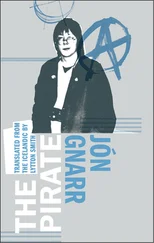I’ve only once beaten up a kid at school on purpose. There was a kid who was always teasing me, jostling me and tripping me and calling me Coppertop Brennivínsson. He would get at me during recess and sometimes follow me home and try to trip me up if we ran into each other in the school corridor. He’s two years older than me. Everyone thinks he’s a jerk.
Shortly before it happened, I’d broken my arm on my bike. I had just gotten a speedometer and I was trying to set a speed record; I rode so fast down a steep hill that I lost control of the bike and hit a pole.
I had to go to the emergency room and get a plaster cast.
The boy came over to me during recess and wanted to see the cast. When he was standing right beside me I hit him really hard in the head with the cast.
He began to scream. It suited him. I liked seeing him screaming. He had annoyed me so many times. And when he was starting to attack me, a teacher came and took him by the scruff of the neck, and marched him to the principal.
A little bit later, the teacher came back and got me and took me to the principal. The principal had me apologize to the boy for having smacked him and then he apologized to me for having teased me and promised never to do that again. He kept his promise. I was really happy to see him cry. You can’t tease someone who has seen you cry.
I often go to the principal. Teachers take me there when they’ve had enough of me and are ready to give up. Sometimes, I have to go to him even though I haven’t done anything bad. But that’s okay because the principal is a good guy. He never scolds me. He talks to me gently. Sometimes he gives me chocolate milk and even a Prince Polo candy bar.
Once, I beat up a teacher. It wasn’t something I planned. It was when I was littler. I was hiding so I climbed up on the big shelf above the classroom door. I imagined that I was an Indian lying in wait, and the teacher was a cowboy who would kill me if she found me.
The teacher walked around the school from end to end, searching for me and calling me. She had long, raven-black hair, which reached all the way down to her butt.
I was teasing her by sometimes answering her.
— I’m here, inside the homeroom!
Then I’d stifle my giggles when she came in. I could see her but she couldn’t see me. She never looked up. One of the times she walked through the door I jumped down towards her.
I don’t know what happened. I did it without thinking. I was just planning to shock her. But she was much more irate than I reckoned. As I fell, I groped the air and grabbed hold of her hair. We both fell to the floor.
I hurt her. She had to have a collar around her neck. That time, the principal got angry with me. He said she had been lucky not to have broken her neck. I realized this with hindsight and so I began to cry. I begged for her forgiveness. I didn’t mean to hurt her.
I often do things I only understand in hindsight. At the time, I don’t know why I do them. One moment, I’m thinking something and then it’s like I’m not thinking anything and all of a sudden I have to do something. Some of those times, someone gets angry with me, and I cry because I realize.

The study has revealed that the boy is very intelligent indeed, more than capable, with a highly developed sense of his own independence — nevertheless, he also seeks, like an infant, to have his needs for food and warmth met. His need for a safe and warm refuge or hiding place conflicts with his desire to go on adventures and to be self-sufficient. Along with a need for intimate and tactile relationships can be seen both fear and resentment towards adult figures, and rebellion against their rule. Jón Gunnar experiences himself as imperfect and even castrated. Often, he has doubts about his abilities, which may manifest as oppositional behavior, because it is better not to want than not to get. His emotional adaptability is poorly developed. He has difficulty controlling his emotions: his need for power and for gratification cannot be deferred. He is aware of the needs his surroundings bring out in him, and when those needs clash with his internal desires, it causes conflict and turmoil.
(National Hospital, Psychiatric Ward,
Children’s Hospital Trust, 09/05/1972)

I don’t have any enemies at school because I don’t get into fights. However, there’s usually a lot of fighting at recess and some kids are always being picked on. There are kids who are strange, behave weird, or dress in silly ways.
One girl, who is called Mental Gunna, always starts crying when she’s teased. She is often all alone, talking to herself. She really is mental. Sometimes lots of kids club around her and tease her until she starts crying. I think it’s sick. I’d never do that.
They’re all always teasing this boy in the class they call Rubber Tarzan, like the character in the book by Ole Lund Kirkegaard. Sometimes someone spits in their palm, and tells him to eat the spittle. And he does. Then they all start laughing, and he does, too. It’s like he hasn’t figured out they’re making fun of him.
My friends at school aren’t necessarily my friends at home. I play with most of the kids in my street. My best friend is Kristján Þór. He’s also my cousin. He doesn’t have any friends but me. We’re always together. We play Legos and Action Man. Kristján Þór is in my class, too. I mostly stopped playing with Stebbi when I started hanging out with Kristján Þór. Other classmates are more like acquaintances, with whom I only play occasionally. Most of them are always practicing soccer. I don’t enjoy soccer except in small doses. I’d never go to soccer practice. I don’t get it, and can’t ever score. Soccer is a difficult and complicated game: I never know what to do until long after I’m supposed to do it. And so no one wants to be on my team.
I’d rather have a snowball fight or play chase during recess than soccer. I do have a Liverpool FC bag and support Liverpool but that’s more to side with others.
I find it annoying being at school when the weather’s good. Those days, I’d rather be outside playing. I think it is unfair to have school during good weather or excellent amounts of snow.
I’m no good at learning. The teacher is always telling me to quit making noise.
— Less chit-chat, Jón!
I think chit-chat is a funny word. I make a lot of chit-chat. I like to rhyme it.
— Kit chit-chats with Nat, Nat chit-chats with Kit, Kit and Nat chit-chat…
— Shush!
Sometimes the teacher sits me away from the other kids, so I’m not bothering them; she sits with me and makes me study. I don’t learn much, even then. Everything is too hard.
My school is an open school. There are no classrooms; instead, everyone learns together in an open space or goes to their homeroom. You don’t get grades like in other schools but instead you’re given comments. You can get Good, Decent, or Fair. Good is best. Yet it really means the same thing as Decent. But in the old days it was different: Good meant best of all. I don’t ever get G in any of my comments. I’m typically given D. Then usually an explanation: Slow progress. Often makes a racket. Disturbs other children.
I find schoolbooks the worst books in the world. They’re difficult. It is like they’re made to be annoying. I get a pain in my forehead from looking at them. Even the pictures in them are annoying. I don’t follow them and I don’t want to learn about them. I only ever enjoy them if there are stories.
I get a sense of suffocation from learning. I get the same feeling when I’m forced to learn as I do when I’m forced to eat food I find disgusting.
Читать дальше




![О Генри - Бабье лето Джонсона Сухого Лога [The Indian Summer of Dry Valley, Johnson]](/books/407344/o-genri-babe-leto-dzhonsona-suhogo-loga-the-india-thumb.webp)









